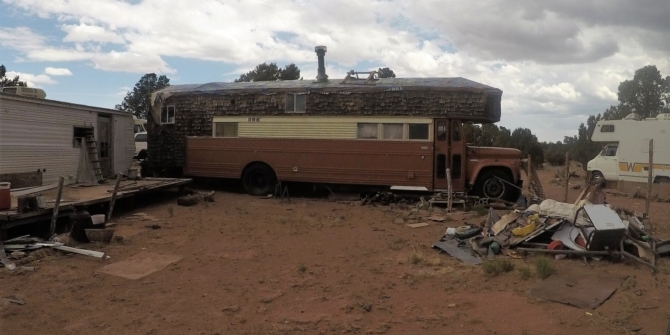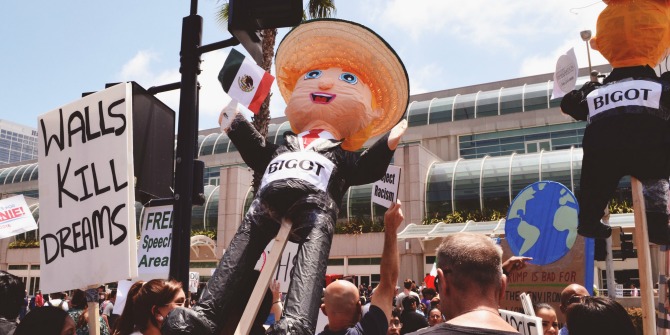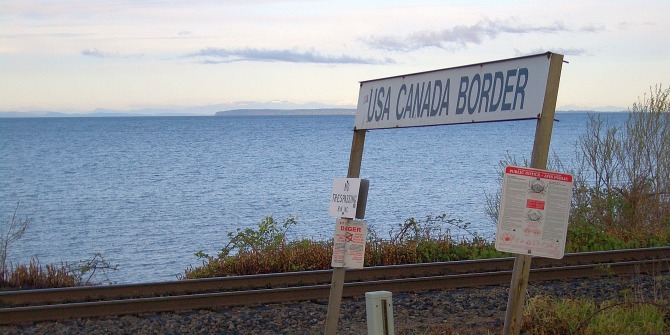 Despite the change of administration to one with far more aggressive rhetoric against Mexicans wishing to come to the US, for those at the border, policies have not changed, only intensified. Susannah Crockford writes that at a time when the federal government offers no help, religious faith groups are supporting undocumented migrants at the border with humanitarian aid and advocacy.
Despite the change of administration to one with far more aggressive rhetoric against Mexicans wishing to come to the US, for those at the border, policies have not changed, only intensified. Susannah Crockford writes that at a time when the federal government offers no help, religious faith groups are supporting undocumented migrants at the border with humanitarian aid and advocacy.
US federal government policy on undocumented migrants crossing the border with Mexico excludes humanitarian aid. The focus is solely on deterrence. The rationale behind this is that they do not want anything to be perceived as encouraging migration. Even minimally following international law would be perceived as encouraging migrants, so in policy and in practice they try to dissuade people from seeking asylum. A recent lawsuit filed against the Department of Homeland Security alleges that Border Patrol agents systematically prevent asylum seekers from applying for asylum, leaving them at risk of serious harm. Agents do not give migrants the chance to claim asylum even if they may have case. The Border Patrol priority is to arrest and remove. Persistent accusations of abuse by Border Patrol agents suggest there is a series of interlinked structural problems with the way agents interact with migrants. The most egregious cases involve federal agents killing migrants, or in a few cases, shooting Mexicans on the Mexican side of the border through the border fence.
In the absence of any aid from federal agencies, Catholic charities offer help and provide advocacy in the US-Mexico border region. Pope Francis, in his encyclical on migration, called migration a “structural reality” that must be dealt with at its root not symptoms. He entreated Catholics to find the face of Jesus in the face of others and to give help to the stranger. The Gospel answer to the challenge of migration is an emphasis on mercy. Pope Francis phrases this as a focus on “the human person”. The Catholic Church wants to address the “chains of injustice” not just give aid to migrants. Migration is an outcome of global inequality not individual choice or crime. In a specific rebuttal to President Donald Trump’s policy of an enhanced wall along the border with Mexico, Pope Francis called for bridges not walls.
Following the Pope’s lead, one of the most outspoken advocates of migrant rights and immigration reform in the US has been the outgoing Bishop of Tucson, Gerald F. Kicanas, whose diocese extends across border. Testifying to Congress in 2015 against the proposed SAFE Act, Bishop Kicanas argued that there is an “ethical imperative for comprehensive immigration reform”. He supports a pathway to citizenship for undocumented migrants. Speaking at a hearing on immigration enforcement held by the Immigration and Border Security Subcommittee of the House Judiciary Committee, he was the only one of four witnesses to stand against the bill. Bishop Kicanas is not alone in taking this position. In January 2017, the Bishops of Arizona Catholic Conference reaffirmed their joint commitment to aiding migrants and supporting a pathway to citizenship and comprehensive immigration reform in light of the executive orders pertaining to refugees and undocumented migrants signed by President Trump.
Groups offering aid at the border are also motivated by religious faith. The Kino-Border Initiative (KBI) is a binational Catholic organisation in the border town of Nogales, Sonora and Arizona. It runs a soup kitchen on the Sonoran side of Nogales, while the administrative office is on the Arizonan side. When I interviewed Joanna Williams, the director of education and advocacy, she told me that the organisation is motivated by the Catholic teaching to help those in need. Migrants are in need. It is not a mandate but a privilege to help them. Of the people they receive, 90 percent are Mexicans who have already been deported; 8-10 percent are Central Americans who are planning on crossing. Most will try to cross again because of the violence and poverty they face in their home countries. Some will give up and return to their places of origin in central Mexico, and they may attempt again at a later date. The staff at the KBI does not help people cross the border, however they will tell them if it is dangerously hot that day and let them know there is no water out in desert. The staff try to educate them on their rights so if they are detained again they know what their rights are and what they can insist on.
“Nogales Border Wall – 12” by Steev Hise is licensed under CC BY NC SA 2.0
Joanna Williams affirmed that the language of political discourse in the US is problematic. The term ‘illegal alien’ is a dehumanising one. These are individuals; each is a human person. She offered the comparison that most Americans will often go over the speed limit, breaking the law, but that does not change the nature of their humanity or make them less than a person. The term ‘alien’ – which is the term used in US immigration legislation – is a way of othering individuals who have different experiences living in the US. Bishop Kicanas also said in his statement to Congress that “no one is illegal in the eyes of God”.
Despite the difficult conditions of the US-Mexican border for undocumented migrants, Joanna Williams said that at the KBI they are hopeful in their work. For her, the beautiful part of working at the border is that they are working with people with great faith and great hope. Migrants believe that God is with them on journey. Something much better is coming for them. They are creating a better life through faith and hope. For the staff of the KBI, God wants people to have life and live abundantly and that vision inspires them forward. Their faith is reaffirmed by moments of joy and beauty, of individual resilience and generosity from the community.
Another group active in the Sonora-Arizona border zone is No More Deaths/No Más Muertes, a volunteer group and ministry of Unitarian Universalist Church of Tucson, which is also faith based. Their focus is on ending deaths of migrants while crossing the border. They run the only humanitarian aid camp for migrants in southern Arizona. Unfortunately, in change to previous policy, under the Trump Administration the Border Patrol has raided their camp looking for undocumented migrants to detain and deport.
The change in immigration enforcement with the Trump Administration has not been a switch of policy, but merely an intensification of the previous policy which criminalizes undocumented migrants, denies migrants and asylum seekers their basic human rights guaranteed under international law, and makes swift deportation the central process in dealing with migrants crossing the southern border without documentation.
Please read our comments policy before commenting.
Note: This article gives the views of the author, and not the position of USAPP – American Politics and Policy, nor the London School of Economics.
Shortened URL for this post: http://bit.ly/2inNSMl
_________________________________
About the author
 Susannah Crockford – Inform
Susannah Crockford – Inform
Susannah Crockford is a Research Officer for Inform. She completed her PhD in May 2017 in the Anthropology Department at LSE. She spent almost 2 years living in Northern Arizona, studying religion and political economy. Her fieldwork centred on the small-town of Sedona and the rural area adjacent to the south rim of the Grand Canyon. Previously, she completed degrees at the University of Cambridge and the University of Amsterdam.







